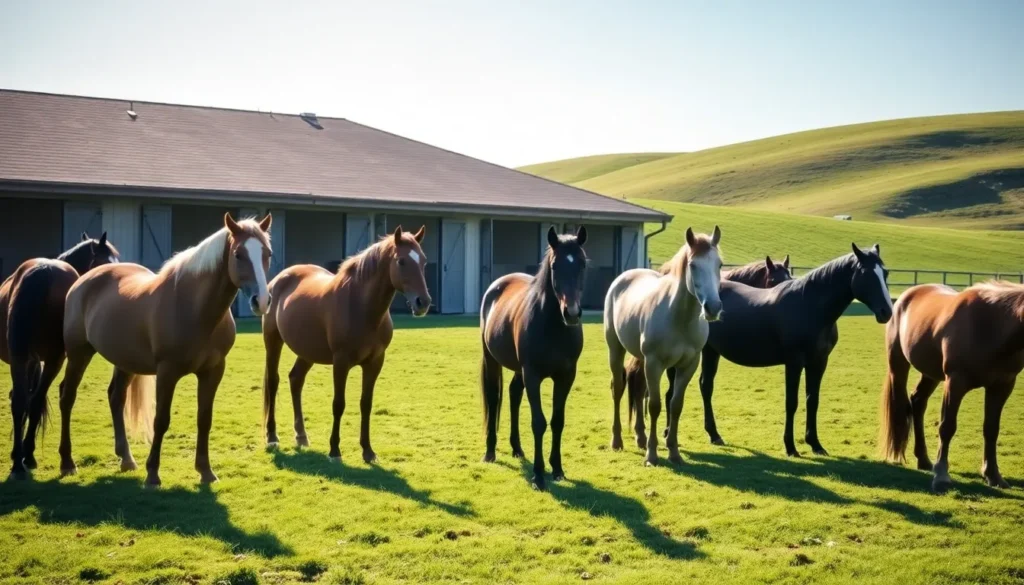Imagine a serene pasture where horses graze peacefully, free from the harness of work and the hustle of competitions. Welcome to the retirement home for horses, where our beloved equine friends can spend their golden years in comfort and happiness. Just like humans, horses deserve a place to unwind, relish the sun, and kick back after a lifetime of service. Let’s trot through the intriguing realm of horse retirement homes, uncovering why they’re essential, what benefits they offer, and how to find the perfect environment for your four-legged companion.
Table of Contents
ToggleUnderstanding The Need For Retirement Homes For Horses

As horses age or face physical challenges, their needs shift dramatically. Once highly active and spirited, many horses retire after years of work, whether in racing, farm tasks, or leisure riding. Understanding this transition is the first step in recognizing why retirement homes are crucial. Horses, just like athletes, face wear and tear on their bodies, leading to a variety of ailments. From joint issues to chronic injuries, the need for rest becomes paramount. This is not merely about providing a roof over their heads: it’s about ensuring they live out their years in dignity and comfort.
The harsh realities of aging can impact a horse’s behavior and health significantly. Boredom or lack of attention can exacerbate these challenges, leading to loneliness and anxiety. Retirement homes cater specifically to these needs, offering a serene, nurturing environment where horses interact, socialize, and thrive.
The Benefits Of Retirement Homes For Horses
Retirement homes for horses offer a buffet of benefits that enhance the quality of life for these majestic animals. First and foremost, they provide a safe, caring atmosphere tailored to the unique requirements of retired horses. An ideal retirement home offers spacious paddocks, access to fresh pasture, and companionship, addressing one of the primary issues faced by retired horses: isolation.
Also, many of these facilities are staffed by knowledgeable caretakers who understand equine health and behavior. This professional care often includes regular monitoring for health issues, specialized diets, and tailored exercise plans designed to keep them healthy and engaged. The community aspect of retirement homes also plays a crucial role. Horses can bond with one another, rekindling a sense of normalcy and providing social interaction that is critical for emotional health.
Finally, retirement homes create a peace of mind for horse owners. Knowing that a trusted facility is caring for their companions allows owners to focus on their lives without constant worry about their horse’s wellbeing.
Key Features Of A Quality Horse Retirement Home
When seeking a retirement home for a horse, there are several must-have features to consider. First, the facility should offer ample space for each horse, including individual or shared stalls that lead to secure pastures. Adequate shelter from harsh weather conditions is essential: after all, no horse wants to stand out in the rain without the option of a dry spot.
Next, nutritional support is paramount. Quality hay, fresh water, and possibly specialized diets help address any individual health concerns. Some retirement homes even provide extra supplements tailored to each horse’s unique needs.
Another crucial aspect is access to regular veterinary care. Routine check-ups and immediate attention to health issues are non-negotiable factors for any quality facility. Also, facilities that offer recreational activities tailored for older horses keep them engaged and psychologically stimulated.
Finally, consider the human element. Facilities should employ experienced staff passionate about horses, someone who can communicate compassionately with both horse and owner. A welcoming and knowledgeable team can make all the difference in ensuring a horse’s comfort and happiness.
How To Choose The Right Retirement Home For Your Horse
Choosing the right retirement home for a horse can feel overwhelming. But, a pinch of research and a dash of personal insight can make the process smoother. Begin by listing specific needs based on your horse’s behavior, health, and age. Knowing whether your horse thrives in social settings or prefers solitude will guide your search significantly.
Next, schedule visits to potential facilities. Observing the environment can provide invaluable insights. Look for clean, spacious conditions with plenty of sunlight and fresh air. Watch how the staff interacts with the animals: their enthusiasm and empathy will reflect the care your horse will receive.
Don’t hesitate to ask questions. Inquire about healthcare protocols, feeding routines, and activity schedules. You can also seek out reviews or testimonials from other horse owners to gauge overall satisfaction. Finally, consider the facility’s location. It should be convenient for visits, as maintaining a connection can ease the transition for both horse and owner.
Stories From Retirement Homes: Horse Rescues And Success Stories
Horse retirement homes serve as sanctuaries, and many have heartwarming stories that emerge from their pastures. Take, for example, a rescue named Daisy, a once-raced Thoroughbred who faced abandonment after her racing days were over. She found a haven at a local retirement facility, where gentle caretakers introduced her to a serene life. Here, she not only regained her weight and health but flourished socially, making friends with retired equines that provide endless camaraderie.
Similarly, consider Buddy, a former police horse who spent his days protecting and serving but retired due to age-related ailments. Upon arrival at his retirement home, he received tailored care and abundant love, slowly blooming back into the playful horse he used to be, a little mischief in his eye and a big heart.
These stories highlight the importance of retirement homes and their ability to transform the lives of horses, offering them the chance to enjoy their golden years amidst a community that understands their past and cherishes their present.
The Role Of Community In Supporting Horse Retirement Homes
The success of horse retirement homes doesn’t rest solely on their facilities or staff: community support is crucial. Local equestrian clubs often rally to provide resources, whether through fundraising events or volunteer efforts. By engaging the community, retirement homes can ensure they have the funds necessary for quality care and improvements.
Also, horse owners are encouraged to participate in visits and events at retirement homes, fostering awareness and appreciation for the work being done there. Engaged communities can provide insights into what is needed most, be it resources for caretaking or educational workshops about horse health and retirement.
The emotional connections that develop between horses and their caretakers, volunteers, and donors create a sense of family, reinforcing the idea that these homes are not just places for horses but thriving communities dedicated to supporting equine well-being.


